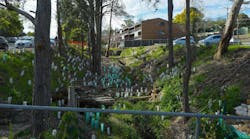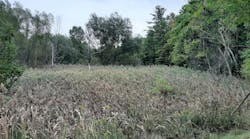IECA Education Program Advances in New Directions
A recent review of IECA’s educational programs has identified new opportunities to enhance the erosion and sediment control industry’s most comprehensive selection of educational services. Involving new educational content, improved quality of training, and innovative delivery methods, these improvements will add even more value to IECA membership. They will supplement the association’s current educational offerings that range from in-depth peer-reviewed professional development courses at the annual international Environmental Connection conference to a wide selection of convenient online training courses.
“This review is part of our regular efforts to make sure that our educational services continue to meet the needs of members and the industry as practices, technologies, and government regulations change,” says Russ Adsit, IECA’s executive director. “We want to offer the best quality education we can.”
“That will mean taking such steps as strengthening our most successful programs, adding new types of courses, improving members’ access to training, and eliminating any services that no longer meet our standards,” adds Jimmy Eanes, IECA’s director of education.
Higher Standards
One goal is to boost the quality of IECA training by replacing the current “IECA-Trained” program, which identifies individuals who have received topic-focused training in a specific area of study from an IECA endorsed educational offering, with training that meets Continuing Education Unit (CEU) requirements. A CEU is a measure of the quality of the training. Typically, a minimum number of CEUs are required to meet the educational requirements of certification bodies, professional societies, and government licensing boards. A panel of experts evaluates the training before assigning CEU credits.
CEUs could be awarded for various types of training, Adsit notes. For example, they could include a training course at the Environmental Connection conference, training presented at a Chapter workshop, or an article printed in a journal.
Revamped Webinars
IECA Webinars let you attend a 60- to 90-minute, online IECA training session anywhere you have access to an Internet connection and a phone or headset. You can take part in the live presentation, ask questions, and receive answers from your instructor who may be located thousands of miles away. Or, you view a recorded session at a time of your choosing.
The Webinars are now being hosted by a new provider. “The process of connecting to the class and participating is easier than in the past,” Eanes says. In addition to new courses that are being added to the list of Webinar choices, existing recorded sessions are being updated to improve the sound and video quality.
Wider Selection
Another goal of IECA is to develop topic-specific courses that meet the needs of students with varying levels of experience and expertise.
“We want to offer a full slate of choices,” says Adsit. “We’d have one course for people just beginning to work in the field, one for people with an intermediate level of experience, and another for those who want the most advanced training.”
This training would include members and non-members alike.
“Many contractors, home builders, developers, and the like won’t attend our training activities because of the depth in which they cover erosion and sediment control,” he says. “However, we regularly receive requests from them to provide basic information about how to comply with NPDES requirements on a job site,” he says. “If we can offer an hour class or even a half-day workshop on that topic in their area, they are more prone to send their employees to it.”
More Venues
That leads to one of the challenges IECA faces in delivering erosion and sediment control education—providing it at a time and location convenient to students.
“IECA has a lot of volunteers who could help present this training if it’s offered locally,” Adsit says. “There are a lot of ways that we could be delivering this kind of information.”
In addition to the annual Environmental Connection courses, Chapter training events, Webinars, and journal articles, one option would be to offer a class simultaneously at multiple locations.
For example, an instructor’s presentation in Atlanta could be cast live to audiences in Chicago, Dallas, and Los Angeles who would view it on a large projector screen. “This would reduce travel expenses, and offer the people gathered the opportunity to receive training and to network,” Adsit explains.
New Training
Eanes notes two areas in which IECA members could benefit from training—green building practices and business management.
“Technical content is at the heart of our education programs, as it should be,” he says. “However, many of our members also are involved in managing a business. While we’ve been offering some classes in this area at the Environmental Connection conference, there’s an interest and opportunity to provide more training.”
Government agencies also are promoting practices, like low-impact development, that can help control erosion and sediment in a more environmentally friendly manner. “It’s the way of the future, and we should be providing more education about it,” Eanes says. “One idea is to participate in reciprocal training with organizations like the United States Green Building Council. They could educate IECA members about green building practices, and we could educate their members about green erosion and sediment control practices.”
Certification Partnerships
IECA recently has replaced its practice of endorsing certification programs that meet IECA approval with a Certification Partner program. “The new program establishes a mutually agreeable arrangement that provides benefits for both IECA and the certification organization,” says Adsit.
The partnership includes a written agreement, which is subject to review and renewal every two years. Among its provisions:
- The Certification Partner must show that the certificate it offers is recognized by a regulatory body or contracting organization for work in the erosion and sediment control or related industry.
- IECA, assisted by the Partner, will develop areas of knowledge, skills, and abilities necessary for a professional in this industry and review them continually.
- The Partner will help IECA develop educational content that meets the needs of its certification program in basic content, review procedures, continuing education, and knowledge necessary in its specific specialty.
- IECA will provide a venue for educational review sessions, knowledge seminars, and continuing education including testing facilities and promotion at the annual meeting, Chapter events, and other IECA-sponsored events.
- Each Partner will publish, enact, and enforce a code of ethics with similar provisions.

